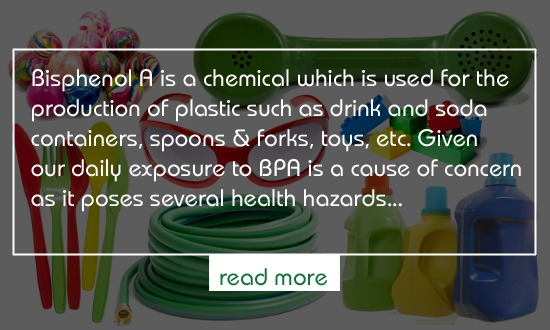BPA-How does it affect our health? Much has been said and written about BPA and its potential health hazards. I was not concerned about it until the arrival of my little munchkin a couple of months ago. Guess that’s what motherhood is all about. Ever since my daughter was born; I have become a careful observer and health conscious. The other day I was shopping at a departmental store when something caught my attention. All the plastic containers were labeled BPA-free. This piqued my interest and I found myself researching about the same on the internet.
BPA stands for Bisphenol A. It is an industrial chemical that resembles synthetic estrogen and has been used to make certain plastics and resins since the 1960s. It is found in poly-carbonate plastics and hence a part of our everyday diet since it is generally used to make food and beverage containers. BPA is also used in epoxy resins which are used to coat the inside of food cans, bottle caps and water supply lines. As such it is a part of our everyday diet- from bottles and cans BPA ends in our food and from food in our system. It is also used for the production of drink and soda containers, spoons & forks, toys, cds, etc. The leaching of BPA into our food is the greatest when the container is heated or damaged.
Given our daily exposure to BPA, it is a cause of concern as it poses several health hazards which are as follows:
- It affects the balance of hormones like estrogen and testosterone causing obesity in children in particular and adversely affects their metabolism.
- Being an endocrine –disrupting compound, it causes hypertension and insulin resistance.
- It badly affects the heart as the production of ‘adiponectin’- the hormone responsible for lowering the risk of heart disease- is slowed down.
- Studies have proved potential effects of BPA on brain and prostate glands. The effects are more pronounced on fetuses, infants and children as their bodies are still developing and inefficient at eliminating such harmful substances from their systems.
However, BPA has primarily been examined for its cancer-causing potential over the years and has been found to be non-carcinogenic in the small doses found in foods. Though nothing has been proved conclusively, yet it is preferable to eat more of fresh food, fruits and vegetables and reduce the consumption of canned foods and plastic bottles and containers.
With BPA becoming ubiquitous in the environment, it is our foremost duty, as parents, to limit or minimize our children’s exposure to BPA.
All it takes is certain wise steps in our day to day lives which are as follows:
- We can replace the canned foods with fresh fruits and vegetables; plastic containers and bottles with glass jars, tetra packs or cans that are labeled “BPA-free”.
- The best we can do is by avoiding plastics marked “PC” or “#7”. A little effort and consciousness on our parts shall ensure a healthy life of our kids which is both a duty and goal of our lives.
Happy Parenting with Budding Star













